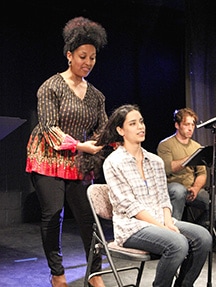
BY DEVIKA C. MEHTA
“Karmany evadhikaras te ma phaleshu kadachana, ma karma-phala-hetur bhur mate sango stvakarmani,” which means - “You are born to perform prescribed duties, but don’t expect anything in return. Your result is driven by many other factors other than your work.” Writer Roshni Shukla of “The Gita and the Gun” fame believes...
“Karmany evadhikaras te ma phaleshu kadachana, ma karma-phala-hetur bhur mate sango stvakarmani,” which means - “You are born to perform prescribed duties, but don’t expect anything in return. Your result is driven by many other factors other than your work.” Writer Roshni Shukla of “The Gita and the Gun” fame believes...

in this significant verse from the Bhagwad Gita and shares her thoughts going down memory lane in an exclusive chat with IJ.
An avid ‘Gita’ reader, Roshni candidly says, “I try to be duty-oriented. However, human life is a reminder of how easy it is to get distracted by something that is glittering and beautiful. But I try to reason back and follow the path directed by Krishna.” Revealing few details about her play, Roshni mentions, “The Gita and The Gun follows Abhiti, living as the target of bullies and with a single mother stuck in the past. Encouraged by nightly visits from a trumpet-playing elephant, Abhiti learns to face her darkest fears.” “The purpose of The Gita & The Gun is to tell a story that is representative of a young woman finding her way through...
An avid ‘Gita’ reader, Roshni candidly says, “I try to be duty-oriented. However, human life is a reminder of how easy it is to get distracted by something that is glittering and beautiful. But I try to reason back and follow the path directed by Krishna.” Revealing few details about her play, Roshni mentions, “The Gita and The Gun follows Abhiti, living as the target of bullies and with a single mother stuck in the past. Encouraged by nightly visits from a trumpet-playing elephant, Abhiti learns to face her darkest fears.” “The purpose of The Gita & The Gun is to tell a story that is representative of a young woman finding her way through...

a multi-hyphenated cultural identity. A story where the topics of youth isolation and violence are articulated within a lyrical and dramatic narrative,” she adds.
When questioned- Why ‘Gita and Gun’?, she replies, “Gita as you can understand comes from Bhagwad Gita; in my play the girl faces some moments where she tries to understand the philosophy behind the guiding principles of the holy scripture. On the other hand, many may relate the play with the current scenario of gun control in US. Abhiti’s father was killed with the use of a gun, then she had another male figure in her life who was a cop. At one point the girl also holds a gun in her hand. So it has metaphorical purpose.”
But will the Indian-American population relate to Bhagwad Gita and the bullying act? She answers yes! “Our community here will identity with Abhiti. As a first generation American, we have to face a lot in day to day life. Almost all of us suffer from a great deal of loneliness, but this play proves that nobody is truly alone. We just have to identify our strengths and weaknesses and gain momentum.”
She also talks about the divergent role of theatre industry, “I love the stage and started working at the age of 15 in Sacramento. I consider it a bigger space as storytelling is an art that is the existence of human culture. Theatre is incredibly sacred to me, but today it is dying and we have to find ways to keep it alive.” On her dream play, she adds, “I want to tell the story of my dad.” In her pastime, Roshni loves to cook Indian and Mexican food and dine with a bottle of wine. Directed by Darcie Crager, ‘The Gita and the Gun’ will play at Art Share Los Angeles on March 31 and April 1. It will be presented by the Southland Company, which is founded by graduates of the UCLA School of Theater, Film and Television.
When questioned- Why ‘Gita and Gun’?, she replies, “Gita as you can understand comes from Bhagwad Gita; in my play the girl faces some moments where she tries to understand the philosophy behind the guiding principles of the holy scripture. On the other hand, many may relate the play with the current scenario of gun control in US. Abhiti’s father was killed with the use of a gun, then she had another male figure in her life who was a cop. At one point the girl also holds a gun in her hand. So it has metaphorical purpose.”
But will the Indian-American population relate to Bhagwad Gita and the bullying act? She answers yes! “Our community here will identity with Abhiti. As a first generation American, we have to face a lot in day to day life. Almost all of us suffer from a great deal of loneliness, but this play proves that nobody is truly alone. We just have to identify our strengths and weaknesses and gain momentum.”
She also talks about the divergent role of theatre industry, “I love the stage and started working at the age of 15 in Sacramento. I consider it a bigger space as storytelling is an art that is the existence of human culture. Theatre is incredibly sacred to me, but today it is dying and we have to find ways to keep it alive.” On her dream play, she adds, “I want to tell the story of my dad.” In her pastime, Roshni loves to cook Indian and Mexican food and dine with a bottle of wine. Directed by Darcie Crager, ‘The Gita and the Gun’ will play at Art Share Los Angeles on March 31 and April 1. It will be presented by the Southland Company, which is founded by graduates of the UCLA School of Theater, Film and Television.

 RSS Feed
RSS Feed
